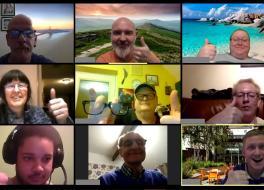

Social distancing has challenged me. But I'll rise to it
7th April 2020
Being unable to use his usual coping strategies, Mark Limbert talks about the effect social distancing is having on his stammer, and the challenges he now faces.
As an adult who’s struggled with fluency since the age of 5, I’ve learnt to manage my stammer and have developed various strategies to do so. Almost all of these revolve around challenging myself, putting myself into uncomfortable situations where I have no choice other than to speak out. For me I’ve found this works the best.
A good example would be when my 7-year-old daughter wanted to join the local Beavers. Sadly, there was a long waiting list but I was told a new group was being set up in the next village. We duly went to the taster session but discovered that for the group to run, volunteer leaders would be required. Rather than shy away from this, I volunteered knowing it would challenge me in terms of speaking to young people, other leaders and parents, and training sessions where I’d be asked to speak out.
This is just one of several activities I constantly challenge myself with; I also teach a junior brass group at weekends.
For me to function fluently I need to challenge myself daily, hence my strategies which have now been taken away.
So, what’s the relevance of reading about what I do? Well, it’s all stopped! Since the outbreak of Covid-19, like everyone else, every activity I’m involved in has ceased. My strategy for social interaction, and most importantly communication, has stopped. I have become isolated from the communication I crave and need.
Last weekend my daughter noticed that I keep repeating letters and words. Perhaps lack of social interaction, coupled with the general anxiety over Covid-19, may have started to have a negative effect on my fluency.
Technology
Listening to radio phone-ins, the distancing is already having an effect on others too. Interestingly, the experts were preaching the virtues of social media and using video applications such as Zoom. All very good advice but it doesn’t quite do it for me.
Sadly, today social networking seems to have taken over good old phone calls and face to face communication. Don’t get me wrong, I am more than happy to participate in banter via Facebook and WhatsApp. But because of who I am and the fluency challenges I face, I have intentionally chosen not to use this as my primary means of communication as I fear it can become a slippery slope.
In a normal social event, there is that impulsive nature of the conversation, the body language — all the clues that I need, and people need with me. It is a more comfortable, but still challenging environment. However, when it comes to socialising through Zoom, which is very much planned, it takes away the impulsive nature and creates anticipated anxiety, which in turn affects my fluency. For me to function fluently I need to challenge myself daily, hence my strategies which have now been taken away.
New challenges
This situation presents me with yet another challenge to rise to: to become comfortable with video conferencing, to get this to a level when it becomes the norm, and to get family, friends and colleagues to appreciate the importance of talking to me and visa-versa.
This situation presents me with yet another challenge to rise to. I must adapt to this.
The way I see it, in the short term this situation is not going to improve and when it eventually does, there’ll be a sort of paradigm shift in the way people communicate, so I must adapt to this. This isn’t going to happen if I just sit back and wait to see if people contact me, so I have no choice but to ‘open up’ about my needs and ask that people contact me for a chat or accept that if I call it’s because I need to chat.
For me this is quite a reversal of my fluency strategies where I’ve actively put myself out there in positions to challenge myself but without other people knowing why. This time I really feel that to help myself I must be fully open and unafraid of this.
Work
I’m still going to work. I am the co-owner of a company that provides components to the broadband network and have been asked to keep supplying.
We have made radical changes to our working practices, creating cells where individuals work in isolation. The whole dynamic of the business has changed – people arrive at staggered times, go to their cell, work and then go home, so again very little communication occurs. It’s very strange.
Today I received a phone call from a supplier and to be honest my fluency was ‘pants’ and went from bad to worse. After the call, for the first time in a long time I chose to email and apologise, explaining the reasons why. His response was, "You certainly don’t need to apologise. I have relatives that stammer and I admire your courage." I think it was worth taking the risk to email him and I will be opening-up far more with everyone and rising again to this new challenge as I always do.
How are you coping with the lockdown? Share your story - email us at editor@stamma.org for more details.































